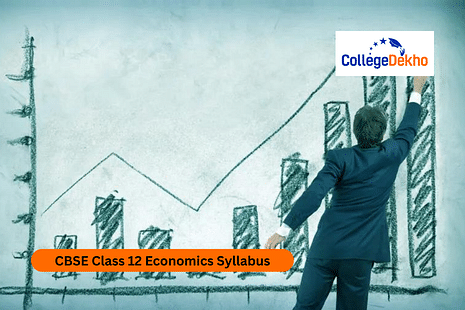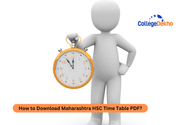CBSE Class 12 Economics Syllabus 2025-26 is made available on CBSE's official website at cbseacademic.nic.in. The Class 12th Economics syllabus comprises Part A: Introductory Macroeconomics and Part B: Indian Economic Development. Check out all details on Economics Syllabus here.
- CBSE Syllabus for Class 12 Economics 2025 PDF
- CBSE Class 12 Economics Syllabus 2025-26: Exam Pattern
- CBSE Class 12 Economics Syllabus 2025-26
- CBSE Class 12 Economics Syllabus 2025-26: Topic Wise
- How To Download CBSE Syllabus for Class 12 Economics 2025-26 …
- CBSE Class 12 Economics Deleted Syllabus 2025-26
- CBSE Class 12 Economics Question Paper Pattern 2025
- CBSE Class 12 Economics Syllabus 2025-26: Question Paper Design
- Suggested List of Projects
- Books Recommended for CBSE Class 12 Economics Syllabus 2025
- Faqs


Never Miss an Exam Update
CBSE Class 12 Economics Syllabus 2025 is divided into 2 parts - Part I Introductory Macroeconomics and Part II Indian Economics Development. Each part in the CBSE Class 12 Economic syllabus 2026 will carry 40 marks, totalling it to 80 marks. The first part has 5 chapters and the second part consists of 3 chapters. National Income and Related Aggregates, Determination of Income and Employment, Development Experience (1947-90) Economic Reforms since 1991, and Current Challenges facing the Indian Economy are some of the important chapters. The CBSE 12th Economics theory exam will be held for 80 marks while the remaining 20 marks will be based on internal assessment/ project work.
Through the syllabus, students can also check the marks allocation. According to the marks allotted to chapters, students can set their priorities. In addition to theory exams, students should also prepare well for the project work. The students can fix a time limit for covering each of the chapters. After going through the chapters, students can also solve the questions from the previous year's question papers This will help in testing their knowledge of the subject. Read the article in detail to understand the exam pattern, marking scheme, and details of the Economics syllabus.
Also Read - CBSE Class 12 syllabus 2025-26
CBSE Syllabus for Class 12 Economics 2025 PDF
The PDF for the CBSE 12 Economics syllabus 2025-26 is now available on the official website of CBSE Academics. Students can download the PDF for the syllabus from the direct links given below:
| CBSE Syllabus for Class 12 Economics PDF |
|---|
CBSE Class 12 Economics Syllabus 2025-26: Exam Pattern
Check the major information about the CBSE Class 12 Economics Exam Pattern 2025 here. Try to refer to the weightage for each topic when planning out your studies accordingly:
- The paper will consist of 20% MCQs or objective questions followed by 40% competency-based questions and the remaining 40% will be subjective or short/long answer questions.
- Theory paper will be conducted for 80 marks and practicals will be conducted for 20 marks.
CBSE Class 12 Economics Syllabus 2025-26
Students studying for the CBSE 12th Board 2025 should go through the syllabus thoroughly and plan their studies accordingly. Here is the complete syllabus for CBSE Class 12 Economics 2025:
Part - Unit Name | Important Topics | Distribution of Marks | |
|---|---|---|---|
Part A - Introductory Macroeconomics | National Income and Related Aggregates | 10 - Marks | |
Money and Banking | 6 - Marks | ||
Determination of Income and Employment | 12 - Marks | ||
Government Budget and the Economy | 6 - Marks | ||
Balance of Payments | 6 - Marks | ||
Part B - Indian Economic Development | Development Experience (1947-90) and Economic Reforms since 1991 | 12 - Marks | |
Current Challenges Facing the Indian Economy | 20 - Marks | ||
Development Experience of India – A Comparison with Neighbours | 08 Marks | ||
Total Theory Paper | 80 Marks | ||
Project Work | 20 Marks | ||
CBSE Class 12 Economics Syllabus 2025-26: Topic Wise
Students can check the detailed information about the CBSE Class 12 Economics Syllabus 2025 according to the different topics from the table given below:
| Unit | Unit Name | Descriptive Syllabus |
|---|---|---|
| 1. | National Income and Related Aggregates |
|
| 2. | Money and Banking |
|
| 3. | Determination of Income and Employment |
|
| 4. | Government Budget and the Economy |
|
| 5. | Balance of Payments |
|
| 6. | Development Experience (1947-90) and Economic Reforms since 1991 |
|
| 7. | Current challenges facing the Indian Economy |
|
| 8. | Development Experience of India – A Comparison with Neighbours |
|
How To Download CBSE Syllabus for Class 12 Economics 2025-26 from the official website?
Students who want to download the syllabus can check out the procedure to download it from the pointers given below:
- Step 1: The students are first requested to visit the official website of CBSE Academics at cbseacademic.nic.in
- Step 2: On the homepage, you will have to click on the option called Curriculum on the menu bar.
- Step 3: A dropdown menu will appear.
- Step 4: You have to now click on the option called Curriculum 2025
- Step 4: On the new page, click on the option called Senior Secondary Curriculum (XI-XII)
- Step 5: Select the option called Academic Electives - (Group-A)
- Step 6: Click on the Economics option to download the PDF.
CBSE Class 12 Economics Deleted Syllabus 2025-26
The table below enables students to view the CBSE Class 12 Economics Deleted Syllabus 2023–24.
| Chapter | Deleted Topics |
|---|---|
| Government Budget and the Economy |
|
| Balance of Payments |
|
| Current challenges facing the Indian Economy |
|
CBSE Class 12 Economics Question Paper Pattern 2025
The syllabus of Class 12 Economics is not divided into term 1 and 2 for the session 2025. The final CBSE Class 12 Economics exam will cover the entire syllabus. The Economics syllabus, however, is divided into two sections: Part A and Part B. Each section of the CBSE Class 12 Economics Syllabus 2025 is covered in two different books. Both books must be studied for the board exams by the students. CBSE Class 12 Economics Question Paper Pattern 2025 is given below:
| Section | Marks per Question | No. of Questions | Total Marks | |
|---|---|---|---|---|
| Theory Exam | 32 | 80 | ||
| Section A | 1 | 20 | 20 | |
| Section B | 4 | 7 | 28 | |
| Section C | 6 | 4 | 24 | |
| Section D | 8 | 1 | 8 | |
| Project Work | 20 | |||
| Pertinence of the Subject | 3 | |||
| Research Projects and Knowledge Content | 6 | |||
| Method of Presentation | 3 | |||
| Viva-Voce | 8 | |||
CBSE Class 12 Economics Syllabus 2025-26: Question Paper Design
Students can check the structure of the question paper that will be provided by CBSE for Economics from the table given below:
| Typology of Questions | Marks | Percentage |
|---|---|---|
|
Remembering and Understanding: Exhibit memory of previously learned material by recalling facts, terms, basic concepts, and answers.
Demonstrate understanding of facts and ideas by organizing, comparing, translating, interpreting, giving descriptions, and stating main ideas | 44 | 55% |
| Applying: Solve problems in new situations by applying acquired knowledge, facts, techniques, and rules in a different way | 18 | 22.5% |
|
Analyzing, Evaluating, and Creating: Examine and break information into parts by identifying motives or causes. Make inferences and find evidence to support generalizations.
Present and defend opinions by making judgments about information, validity of ideas, or quality of work based on a set of criteria. Compile information together in a different way by combining elements in a new pattern or proposing alternative solutions. | 18 | 22.5% |
| Total | 80 | 100% |
Suggested List of Projects
Micro and Small Scale Industries | Food Supply Channel in India |
|---|---|
Contemporary Employment situation in India | Disinvestment policy of the government |
Goods and Services Tax Act and its Impact on GDP | Health Expenditure (of any state) |
Human Development Index | Inclusive Growth Strategy |
Self-help group | Trends in Credit availability in India |
Monetary Policy Committee and its functions | Role of RBI in Control of Credit |
Government Budget & its Components | Trends in budgetary condition of India |
Exchange Rate determination – Methods and Techniques | Currency War – reasons and repercussions |
Livestock – Backbone of Rural India | Alternate fuel – types and importance |
Sarva Shiksha Abhiyan – Cost Ratio Benefits | Golden Quadrilateral- Cost ratio benefit |
Minimum Support Prices | Relation between Stock Price Index and Economic Health of a Nation |
Waste Management in India – Need of the hour | Minimum Wage Rate – Approach and Application |
Digital India- Step towards the future | Rain Water Harvesting – A solution to water crisis |
Vertical Farming – An alternate way | Silk Route- Revival of the past |
Make in India – The way ahead | Bumper Production- Boon or Bane for the farmer |
Rise of Concrete Jungle- Trend Analysis | Organic Farming – Back to the Nature |
Environmental Crisis | Comparative Study of Economies (Maximum three economies) |
Aatmanirbhar Bharat | e-Rupee (e- ₹) |
Sri Lanka’s Economic Crisis | Sustainable Development Goals (SDG’s) |
New Education Policy (NEP) 2020: A Promise for a New Education System | G-20: Inclusive and Action Oriented |
Amrit Kaal: Empowered and Inclusive Economy | Cashless Economy |
Any other newspaper article and its evaluation on basis of economic principles | Any other topic |
Books Recommended for CBSE Class 12 Economics Syllabus 2025
The books listed below cover the CBSE Class 12 Economics syllabus for 2025 in great detail.
S.No | Name of Books | Published By |
|---|---|---|
1 | Statistics for Economics | NCERT |
2 | Indian Economic Development | NCERT |
3 | Introductory Microeconomics | NCERT |
4 | Macroeconomics | NCERT |
5 | Supplementary Reading Material in Economics | CBSE |
Stay tuned to CollegeDekho for the most up-to-date CBSE 2025 information. Good Luck!
FAQs
CBSE Class 12 Economics exam is a total of 100 marks, 30 marks have been allotted for project work and viva. The students must secure passing marks separately in the Project Work and written examinations of economics.
The topics that were removed from "Current Challenges Facing the Indian Economy" were: Infrastructure: definition and types; case studies; energy and health; problems and policies; poverty (absolute and relative); and infrastructure programs.
Chapters like National Income and Related Aggregates, Money and Banking, Determination of Income and Employment, Government Budget and the Economy, and Balance of Payments are included in Part 1 of CBSE Class 12th Economics Syllabus 2025.
No, CBSE Class 12th Economics Syllabus 2024 is not different from last year's syllabus. The topics included in each part of the syllabus are basically the same so the students can use the last year's books.
The weightage of CBSE Class 12th Economics Syllabus 2025 is 80 marks. The total number of marks allotted for the economics subjects is 100 out of which 80 marks are for theory exams and 20 marks are offered for the project work.
To prepare for the CBSE Class 12th Economics Syllabus 2025, make sure that you have a study plan that includes all the important topics of the syllabus so that you can give enough time to all the units and the topics accordingly.
Yes, it is very important to download the CBSE Syllabus for Class 12 Economics. Without the syllabus, students are not able to get the perfect idea regarding the topics that are included in the board exams.
Some chapters in the first part of the CBSE Syllabus for Class 12 Economics have the lowest weightage. These are chapters like Government Budget and the Economy, Balance of Payments, and Money and Banking.
Challenges of the Indian economy is one of the most important chapters in the CBSE Syllabus for Class 12 Economics. This chapter is included in the second part of the subject. It has one of the highest weightage of 20 marks.
There are two parts that are included in the CBSE Syllabus for Class 12 Economics: Introductory Macroeconomics and Indian Economic Development. Both parts are equally important for the students to learn.
To complete the CBSE Syllabus for Class 12 Economics, students need to focus on one subject at a time. You can do so by allotting a specific amount of time for each subject.
CBSE Syllabus for Class 12 Economics is now available on the official website of CBSE Academics. You have to click on the option called Curriculum on the menu bar in order to download the syllabus of your choice.

























